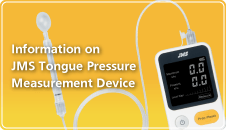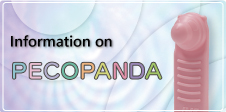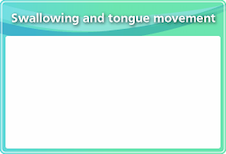Swallowing and tongue movement
Swallowing
The tongue moves food in the oral cavity, holds food
when masticating, and collects food bolus on the tongue
before swallowing during the preparatory period of
feeding such as chewing, formation of bolus, and transfer,
and the oral phase. It plays a central role. There are soft,
tuned foods in the elderly care setting that do not need to
be chewed, but it is necessary to keep the tongue from
the pharynx to the esophagus to feed and swallow these
foods.
Relation tongue function and undernutrition
it is mentioned about the relation between tongue function and PEM (protein energy malfunction, thereafter undernutrition) in this section.
The below results were found by the measurement of maximum tongue pressure applying for institutionalized elderlies according to the study "Relationship between tongue Pressure and Malnutrition in the Institutionalized Elderly".
-
●Elderlies with / without choking(kPa)
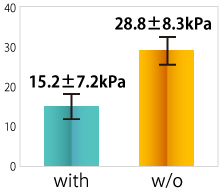
-
●Elderlies with / without spilling food(kPa)
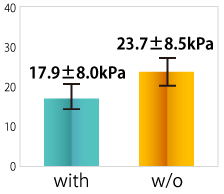
-
●Elderlies with / without hyper salivation(kPa)
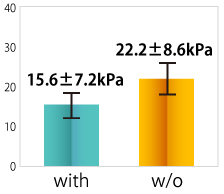
-
●Differences of tongue pressures by food(kPa)
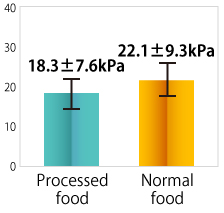
-
●Differences of tongue pressures by motion range(kPa)
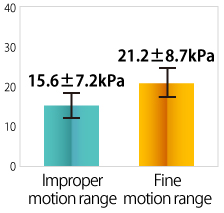
-
●Differences of tongue pressure by motion pace(kPa)
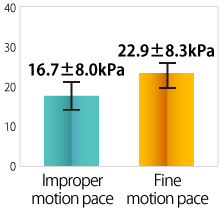
- There are correlations between the performance of tongue motion range and choking and spilling food.
- Elderlies who take normal food has fine motion range and pace but many elderlies who take processed food suffer improper motion range and pace.
- It is not clear to identify the correlation between tongue motion range & pace and undernutrition but the tongue pressure of the elderlies who have risks of undernutrition is 17.8±8.5kPa and the tongue pressure of the elderlies who are in good health is 21.9±8.5kPa. There is a tendency that the tongue pressure of elderlies who have risks of undernutrition is lower.
It is found under this study;
- The tongue pressure of the elderlies who has good tongue motion range and pace is higher
- The tongue function of the elderlies who take processed food and have choking and spilling food is declining.
- There is a tendency that the tongue pressure of elderlies who have risks of undernutrition is lower.
Therefore, elderlies with lower tongue pressure suffer choking and spilling food, have difficulties for eating. As the result, they are not able to take sufficient nutrition and suffer undernutrition.
The nutrition condition of elderlies relates with the tongue function if such elderlies are institutionalized.
If nutrition is not sufficient, declined muscles become weaker and tongue function would be also declined. Subsequently, undernutrion condition may be worsen.
It is necessary to build up body muscle as well as the rehabilitation of tongue in order to prevent under nutrition.
Reference:
"Relationship between Tongue Pressure and Malnutrition in the Institutionalized Elderly,
Miho Kodama, Takeshi Kikutani, Mitsuyoshi Yoshida, Shigeru Inaba
Japanese Society of Gerodontology, 19(3): 161-168, 2004.

